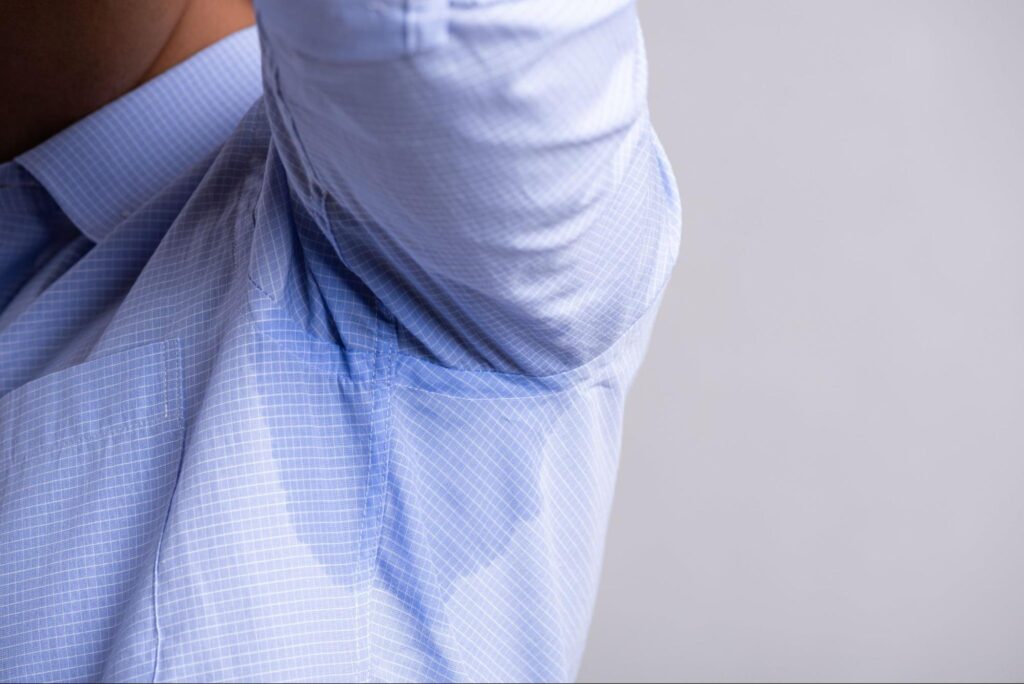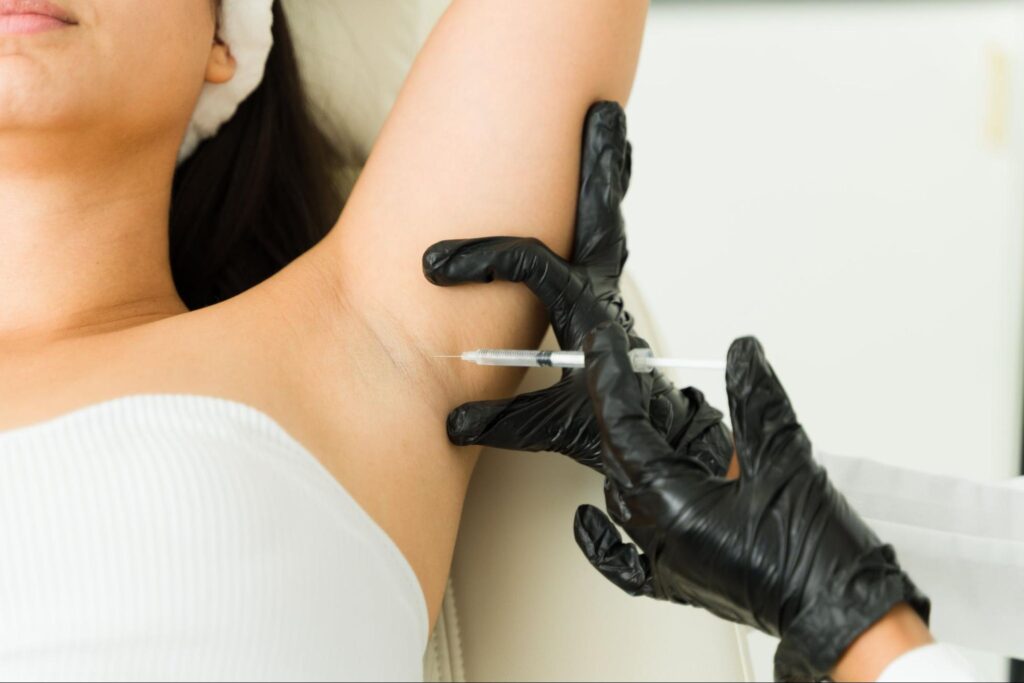Excessive sweating can be a frustrating condition that impacts not only your comfort but your confidence as well. Whether it is warm outside or even when you are sitting in a cool room, sweating excessively can feel like a constant battle.
If you’ve been struggling with excessive perspiration, known as hyperhidrosis, and are looking for a solution, post-summer might just be the perfect time to address this issue.
What is Hyperhidrosis?
Hyperhidrosis is a medical condition characterized by excessive sweating that goes beyond what is necessary to regulate body temperature. People with this condition often find themselves sweating in situations where it is unnecessary—such as sitting indoors in a cool space, resting, or during minimal physical activity.
Hyperhidrosis can affect specific areas like the palms, underarms, feet, and face, or it can cause generalized sweating all over the body.
There are two main types of hyperhidrosis:
- Primary Hyperhidrosis. This type is usually hereditary and is not caused by an underlying medical condition. The excessive sweating typically affects localized areas such as the armpits, hands, or feet.
- Secondary Hyperhidrosis: This type is caused by an underlying medical issue such as hormonal imbalances, medications, infections, or other health conditions. Unlike primary hyperhidrosis, secondary hyperhidrosis often causes more generalized sweating.
No matter the type, sweating disorders can negatively impact your daily life, leading many people to seek effective hyperhidrosis therapy to regain control.

Causes of Hyperhidrosis
Excessive sweating can be triggered by several different factors, and understanding what contributes to hyperhidrosis can help you determine the right treatment options:
- Overactive Sweat Glands. The most common cause of primary hyperhidrosis is overactive sweat glands. While sweating is a natural process designed to cool the body, individuals with hyperhidrosis produce far more sweat than needed, regardless of the temperature or their activity level. This overactivity can occur in specific areas of the body, such as the underarms or hands.
- Genetics. Primary hyperhidrosis often runs in families, suggesting a genetic component to the condition. If your parents or siblings suffer from excessive sweating, it is more likely that you’ll experience it as well. The hereditary nature of this condition can make it frustrating, but it also means treatments like neurotoxins may offer a reliable solution.
- Hormonal Changes. For those experiencing secondary hyperhidrosis, hormonal imbalances are often to blame. Conditions like menopause, pregnancy, thyroid issues, and diabetes can cause excessive sweating. Hormonal changes affect the body’s temperature regulation, leading to unpredictable or excessive sweat production.
- Medications and Medical Conditions. Certain medications, such as antidepressants, diabetes drugs, and treatments for neurological conditions, can cause secondary hyperhidrosis as a side effect. Medical conditions like infections, hyperthyroidism, or autoimmune disorders can also lead to excessive sweating. Identifying and addressing the root cause of your hyperhidrosis is crucial in finding an effective treatment.
Impact of Hyperhidrosis on Daily Life
Hyperhidrosis doesn’t just affect your physical appearance—it can also have a significant impact on your emotional well-being and quality of life. Here are some of the ways excessive sweating can negatively affect individuals:
- Social Anxiety and Embarrassment. Living with excessive sweating can be incredibly stressful in social situations. Constantly worrying about visible sweat stains, damp palms, or body odor can make it difficult to feel confident in public settings. For some people, the fear of sweating in social situations can even lead to social anxiety, isolation, or embarrassment.
- Discomfort and Skin Irritation. Hyperhidrosis isn’t just inconvenient—it can be physically uncomfortable. Excessive sweating, especially in areas like the armpits, groin, and feet, can lead to skin irritation, rashes, and chafing. The constant moisture can also contribute to fungal infections or bacterial growth, causing unpleasant odors or additional skin problems.
- Clothing and Wardrobe Limitations. One of the most common complaints from those with hyperhidrosis is the impact it has on their wardrobe choices. When you are constantly sweating, it is hard to wear certain fabrics or colors without worrying about visible sweat stains. This limits your wardrobe options and can make it difficult to feel confident in what you wear.
- Decreased Productivity. In the workplace, excessive sweating can make routine tasks more challenging. For example, sweaty hands can make it difficult to hold onto objects, use tools, or shake hands with others. In professional environments, this can impact your confidence, interactions, and overall productivity.
What Are Neurotoxins?
Neurotoxins, such as botulinum toxin (Botox), are one of the most effective treatment options for managing hyperhidrosis. Neurotoxins work by temporarily blocking the nerve signals that trigger sweat production in the treated area.
When injected into areas prone to excessive sweating—like the underarms, palms, or soles of the feet—the neurotoxin reduces sweat production by targeting the sweat glands directly.
This treatment is quick and minimally invasive, offering results that can last anywhere from 3 to 4 months, making it a popular choice for those looking to regain control over their excessive sweating.
Neurotoxins are FDA-approved for treating hyperhidrosis, making them a safe and effective option for sweat management.
Why Post-Summer is the Ideal Time to Treat Hyperhidrosis
Many people find that post-summer is the perfect time to address hyperhidrosis. Here are a few reasons why this transitional season offers a great opportunity for managing excessive sweating:
1. Cooler Weather Equals Less Sweat
As the temperatures cool down after summer, many people experience reduced sweating naturally. This makes post-summer the ideal time to start a hyperhidrosis treatment like neurotoxins.
With the initial intensity of sweating minimized by cooler temperatures, the treatment can be more effective, providing you with long-lasting relief throughout the fall and winter months.
2. Reduced Sun Exposure
After summer, there is less sun exposure, which means your skin is less likely to be irritated by the heat and UV rays. This makes it easier for your body to heal from treatments like neurotoxin injections without the added stress of summer conditions.
It also reduces the risk of post-treatment complications such as swelling or redness caused by excessive sun exposure.
3. Extended Results During Fall and Winter
When you begin hyperhidrosis therapy in the cooler months, the effects of neurotoxin treatments may last longer. Since your body naturally produces less sweat in colder temperatures, starting treatment now can help you maintain results well into the next spring and summer. By managing your sweat during fall and winter, you can head into the next warm season feeling confident and in control.
4. Prepare for Special Occasions
With the holiday season approaching, many people are thinking about upcoming events, parties, and gatherings. Starting hyperhidrosis treatment now ensures you’ll feel confident and dry during all of your special occasions. Whether you are attending a family gathering or a work function, you can say goodbye to embarrassing sweat stains and focus on enjoying yourself.
Address Hyperhidrosis Today!

Don’t let excessive sweating control your life. If you’re struggling with hyperhidrosis, Allure Aesthetics & Medical Spa in Fayetteville, NC, offers personalized hyperhidrosis therapy that can help you manage your symptoms and regain your confidence.
With neurotoxin treatments tailored to your specific needs, you can finally get relief from excessive sweating and enjoy the cooler months without the worry of sweat-related discomfort.
Take control of your hyperhidrosis today by scheduling a consultation with us. Our team is here to help you feel confident and comfortable in your skin all year round!



